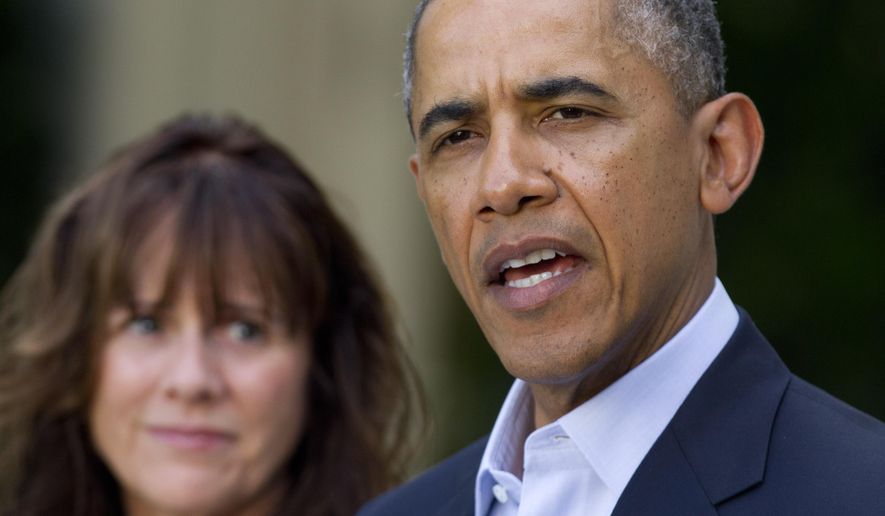Obama administration officials broke federal law when they exchanged five Taliban warriors for Army Sgt. Bowe Bergdahl, the government’s top investigative office said Thursday in a report that marks the latest finding of legal overreach by President Obama.
Officials neglected to give Congress a 30-day notification and illegally switched money from one account to another to conduct the swap, the Government Accountability Office said.
Mr. Obama defended the exchange as legal use of his powers as commander in chief and said he had to withhold information from Congress to preserve secrecy in delicate negotiations with the Taliban.
But members of Congress from both sides of the aisle questioned the decision on the grounds of whether the U.S. was right to free the potentially dangerous Taliban fighters and whether Mr. Obama broke the law by not consulting with Congress.
The GAO said the Defense Department did not break any law when it determined these five Taliban were no longer threats to the U.S. Rather, the violations were Defense officials’ failure to tell Congress ahead of time about the transfer and the $988,400 expenditure to conduct the operation.
“DOD obligated funds that were not legally available” and must report itself for breaking the law, the GAO legal analysts said.
The GAO also found a discrepancy in the eventual notification. The Defense Department told investigators that it sent a letter dated May 31, the date of the transfer, but congressional officials said they weren’t officially notified in writing until June 2.
Rear Adm. John Kirby, a Pentagon spokesman, rejected the GAO’s conclusions and said Mr. Obama’s attorneys in the Justice Department approved the exchange as a lawful exercise of presidential powers delegated to him as commander in chief under Article 2 of the Constitution.
“The administration had a fleeting opportunity to protect the life of a U.S. service member held captive and in danger for almost five years. Under these exceptional circumstances, the administration determined that it was necessary and appropriate to forgo 30 days’ notice of the transfer in order to obtain Sgt. Bergdahl’s safe return,” he said.
Sen. Susan M. Collins, a Maine Republican who was one of nine senators to request the GAO analysis, said it was “completely disingenuous” to blame expediency, given that Congress has been informed about a number of sensitive matters in the past.
“It simply doesn’t make sense that members of Congress, particularly the leaders of the Senate intelligence committee, were not informed,” she said, speculating that Mr. Obama didn’t comply with the law because he knew he wouldn’t be able to get approval from key lawmakers.
“The president’s decision is part of a disturbing pattern where he unilaterally decides that he does not have to comply with provisions of laws with which he disagrees,” Ms. Collins said.
PHOTOS: Politicians in prison: Public servants who've served time
It’s unclear what effect the GAO ruling has. As Congress’ chief investigative arm, the agency does not have the power to compel the administration to change course.
A lawsuit could also be a stretch, given that federal courts often shy away from settling disputes between the other two branches of government.
But that’s not always the case.
In June, the Supreme Court ruled unanimously that Mr. Obama overstepped his bounds when he made recess appointments to the National Labor Relations Board in early 2012, even though the Senate was meeting every three days specifically to deny him that power.
In that instance, the justices ruled that a company had standing to sue because a company was able to show it was harmed by a decision made by the NLRB appointees.
A federal district court this year also concluded that Mr. Obama’s nondeportation policies violated federal law, though the judge ruled the case had to go through a personnel panel, not the federal courts, so those policies remain in effect.
Mr. Obama has argued that he has to take action because Congress, where control of the two chambers is split, has deadlocked on his agenda. He says lack of action in Congress justifies testing the limits of executive power.
Sgt. Bergdahl has returned to duty, but his attorney told CBS News this week that once the investigation into his actions is over, the soldier wants to leave the Army and pursue a college degree.
The Army is investigating accusations that Sgt. Bergdahl deserted his post in Afghanistan in 2009.
He was held captive by the Taliban for nearly five years and gained freedom in May after Mr. Obama approved the release of the five Taliban fighters held at the detention facility at Guantanamo Bay, Cuba.
Congress has repeatedly put restrictions on the president’s ability to release detainees from Guantanamo.
• Stephen Dinan can be reached at sdinan@washingtontimes.com.




Please read our comment policy before commenting.